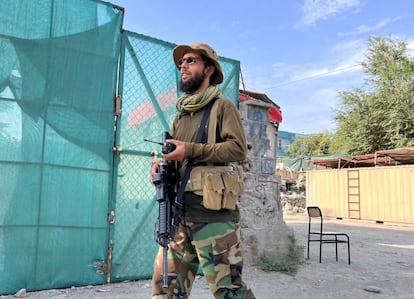Silence surrounds Kabul house where Al-Zawahri died: ‘Go away and stop snooping around’
The Taliban accuse the US of breaking the Doha agreement by killing the leader of Al Qaeda, while Washington suggests it is Afghanistan that violated the deal by sheltering terrorists

Could the leader of Al Qaeda, one of the most wanted terrorists in the world, live in the heart of Kabul without the approval of his allies in the Taliban emirate? The question floated rhetorically in the air early Tuesday morning in Kabul. Tension was building up around the Sherpur building, a wealthy neighborhood of the Afghan capital where the United States claims to have killed Ayman Al-Zawahri, who in 2011 succeeded Osama Bin Laden at the head of Al Qaeda.
Armed men in military uniform threatened reporters hanging around the Ghazanfer bank headquarters, near the scene. But there was no great security deployment. “Get out of here and stop investigating!”, a man dressed in civilian clothes with a walkie-talkie said minutes later on a nearby street, while trying to clear the metal gate that gives access to the plot on which the attacked house supposedly stands.
This was not just any Monday in Kabul. The death of the terrorist leader was on the lips of many, but hardly anyone dared to speak in front of a reporter, much less a foreign one. Early in the morning, before the shops opened and the traffic intensified, a group of men milled around the journalists in front of a cluster of houses surrounded by a wall, allegedly the spot where a drone strike hit on Sunday, According to local media, nobody lived there. This is one of the few things that a young man named Noor Ahmad, originally from Kandahar province, but who now works in Kabul, shared with reporters. Moments later, the man with the walkie-talkie showed up and broke up the little gathering.
The authorities of the Islamic Emirate of Afghanistan, as the Taliban call the country, have condemned the attack, but without citing victims —the alleged death of Al-Zawahri is not mentioned— or specific targets. But the attack, carried out with a drone according to Washington, represents a “flagrant violation of international principles and the Doha agreement,” said the Taliban spokesman, Zabihullah Mujahid, in a statement made public on Monday night via Twitter. The message talked about a “repetition of the failed experience of the last 20 years,” alluding to the presence in Afghanistan of international troops led by the United States from 2001 to 2021.
An agreement signed in January 2020 in the capital of Qatar between the administration of then-US President Donald Trump and the Taliban included, among other points, that Afghanistan would not be a base for terrorists who threaten the United States. For its part, Washington has implied that it is the Taliban who were breaking that agreement by harboring Al-Zawahri.
The Doha agreement was supposed to open the path to peace, ending two decades of international troop presence in Afghanistan, a country that continues to be mired in violence and underdevelopment. But everything came to a head a year ago with the US withdrawal. The Taliban began to gain power, and by August 15, 2021, the radical rebels took Kabul and established the current Emirate.
Tu suscripción se está usando en otro dispositivo
¿Quieres añadir otro usuario a tu suscripción?
Si continúas leyendo en este dispositivo, no se podrá leer en el otro.
FlechaTu suscripción se está usando en otro dispositivo y solo puedes acceder a EL PAÍS desde un dispositivo a la vez.
Si quieres compartir tu cuenta, cambia tu suscripción a la modalidad Premium, así podrás añadir otro usuario. Cada uno accederá con su propia cuenta de email, lo que os permitirá personalizar vuestra experiencia en EL PAÍS.
¿Tienes una suscripción de empresa? Accede aquí para contratar más cuentas.
En el caso de no saber quién está usando tu cuenta, te recomendamos cambiar tu contraseña aquí.
Si decides continuar compartiendo tu cuenta, este mensaje se mostrará en tu dispositivo y en el de la otra persona que está usando tu cuenta de forma indefinida, afectando a tu experiencia de lectura. Puedes consultar aquí los términos y condiciones de la suscripción digital.









































